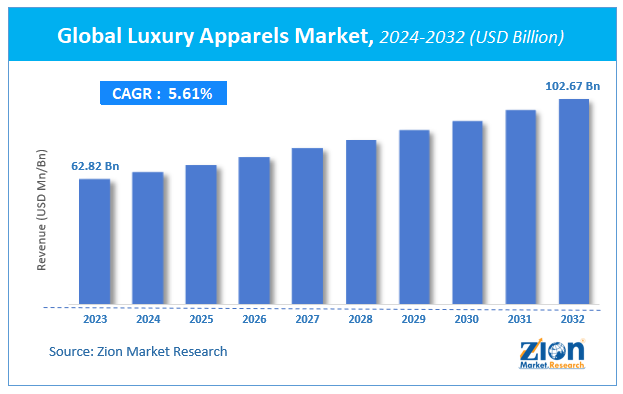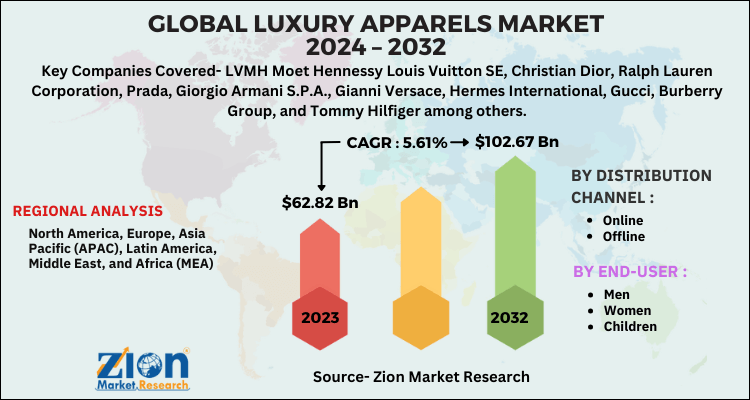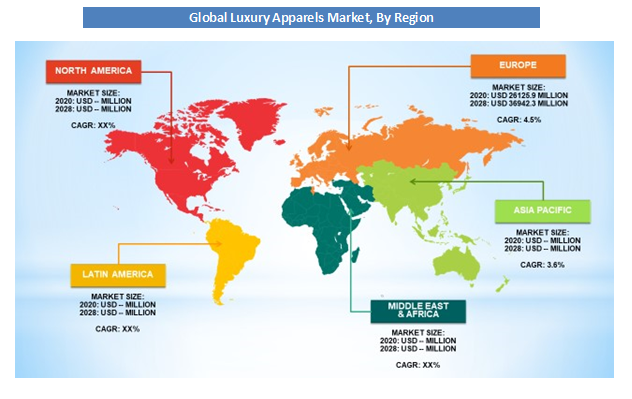Luxury Apparels Market Size, Share, Trends, Growth 2032

Luxury Apparels Market - By Distribution Channel (Online, Offline), By End User (Men, Women, Children), and By Region - Global Industry Analysis, Size, Share, Growth, Latest Trends, Regional Outlook, and Forecast 2024 - 2032
| Market Size in 2023 | Market Forecast in 2032 | CAGR (in %) | Base Year |
|---|---|---|---|
| USD 62.82 Billion | USD 102.67 Billion | 5.61% | 2023 |
Luxury Apparels Market Insights
According to a report from Zion Market Research, the global Luxury Apparels Market was valued at USD 62.82 Billion in 2023 and is projected to hit USD 102.67 Billion by 2032, with a compound annual growth rate (CAGR) of 5.61% during the forecast period 2024-2032. This report explores market strengths, weakness, opportunities, and threats. It also provides valuable insights into the market's growth drivers, challenges, and the future prospects that may emerge in the Luxury Apparels Market industry over the next decade.
Luxury Apparels Market: Overview
The global Luxury apparel market comprises designer clothing and accessories (Hats, scarves, belts) that are typically made of high-end, pure materials such as cotton, leather, silk, denim, and others. They are typically characterized by high price points, justified by the unique designs and higher quality materials and craftsmanship employed for production.
The rise in disposable income clubbed with a shift in the lifestyle patterns of millennials can be attributed as one of the driving forces of this market. One of the recent trends has been the surge in e-commerce of luxury apparel. Several brands have now resorted to online mediums for marketing as well as sales of their products through their websites and social media platforms. Sales and discount offers offered online have now become ubiquitous, and are almost non-existent in the offline mode. Another rising trend among luxury brands is the adoption of sustainable materials for production, as the Millennials and Generation Z are becoming more conscious of the environmental impact of luxury apparel, for instance, those made of pure leather and other such materials.
Luxury Apparels Market: Growth Factors
A major growth driver in this market recently has been the increased communication on social media platforms through influencers and bloggers, who are influencing the sales of luxury apparel as the majority of customers rely on credible reviews and word of mouth before investing in such expensive products
Being the major driver of luxury sales, Millennial and Gen Z consumers are expected to augment this market due to their changing lifestyle patterns, caused by rapid urbanization and rising income levels. Companies such as Louis Vuitton and Christian Dior are actively coming up with engaging digital campaigns and celebrity collaborations to attract this segment.
Luxury Apparels Market: Segment Analysis
This is attributable to the disruption in offline sales caused by the Covid-19 outbreak. Lockdowns and other restrictions have propelled online sales as people continue to stay at home. Online platforms also provide several options to choose from along with the added benefit of seasonal sales and discount offers. The comfort of shopping from home and the delivery of high-quality luxury products at the doorstep may also augment this segment.
This is attributable to a wide range of products available in female fashion items in terms of color pallets, styles, designs, and materials. Increasing fashion awareness among women through digital media clubbed with a rising disposable income is also anticipated to drive this segment.
Luxury Apparels Market: Report Scope
| Report Attributes | Report Details |
|---|---|
| Report Name | Luxury Apparels Market |
| Market Size in 2023 | USD 62.82 Billion |
| Market Forecast in 2032 | USD 102.67 Billion |
| Growth Rate | CAGR of 5.61% |
| Number of Pages | 110 |
| Key Companies Covered | LVMH Moet Hennessy Louis Vuitton SE, Christian Dior, Ralph Lauren Corporation, Prada, Giorgio Armani S.P.A., Gianni Versace, Hermes International, Gucci, Burberry Group, and Tommy Hilfiger among others. |
| Segments Covered | By Distribution Channel, By End User, And By Region |
| Regions Covered | North America, Europe, Asia Pacific (APAC), Latin America, Middle East, and Africa (MEA) |
| Base Year | 2023 |
| Historical Year | 2018 to 2022 |
| Forecast Year | 2024 - 2032 |
| Customization Scope | Avail customized purchase options to meet your exact research needs. Request For Customization |
Luxury Apparels Market: Regional Analysis Preview
This is attributable to the presence of globally leading luxury brands such as Louis Vuitton, Versace, Burberry, and Christian Dior among others. Moreover, the growing appeal of a luxurious lifestyle, high buying power, and celebrity endorsements are expected to generate demand in this region.
This surge is due to a developing standard of living and purchasing power, causing an increased brand awareness and consciousness, especially in countries such as China, India, and South Korea. A number of luxury brands are expected to increase their retail footprint in these countries to attract well-to-do millennials. For instance, industry leader LVMH over the past 10 years has gradually shifted its retail center of gravity towards the Asia Pacific. This region (excluding Japan) now accounts for almost 30 percent of the conglomerate’s retail footprint.
Key Market Players & Competitive Landscape
Some of the key players in the luxury apparels market are
- LVMH Moet Hennessy Louis Vuitton SE
- Christian Dior
- Ralph Lauren Corporation
- Prada
- Giorgio Armani S.P.A.
- Gianni Versace
- Hermes International
- Gucci
- Burberry Group
- Tommy Hilfiger
With the growth of the online medium, luxury brands will now have to start offering bespoke and exclusive online experiences to customers such as video boutiques, virtual catwalks, private viewings, and other customized services. Digitalization and e-commerce penetration are expected to become mainstream as Covid-19 continues to exist.
The global luxury apparels market is segmented as follows:
By Distribution Channel
- Online
- Offline
By End User
- Men
- Women
- Children
By Region
- North America
- The U.S.
- Canada
- Europe
- France
- The UK
- Spain
- Germany
- Italy
- Rest of Europe
- Asia Pacific
- China
- Japan
- India
- South Korea
- Southeast Asia
- Rest of Asia Pacific
- Latin America
- Brazil
- Mexico
- Rest of Latin America
- Middle East & Africa
- GCC
- South Africa
- Rest of Middle East & Africa
Table Of Content
Methodology
FrequentlyAsked Questions
According to a report from Zion Market Research, the global Luxury Apparels Market was valued at USD 62.82 Billion in 2023 and is projected to hit USD 102.67 Billion by 2032.
According to a report from Zion Market Research, the global Luxury Apparels Market a compound annual growth rate (CAGR) of 5.61% during the forecast period 2024-2032.
Some of the key factors driving the global luxury apparels market growth are changing lifestyle patterns, surge in e-commerce, growing brand awareness and disposable income of consumers.
Europe region held a substantial share of the luxury apparels market in 2020. This is attributable to the presence of major players such as Louis Vuitton, Versace, Burberry and Christian Dior among others. Asia Pacific region is projected to grow at a significant rate owing to the rising demand for luxury apparels in developing economies such as China and India.
Some of the major companies operating in the luxury apparels market are LVMH Moet Hennessy Louis Vuitton SE, Christian Dior, Ralph Lauren Corporation, Prada, Girogio Armani S.P.A., Gianni Versace, Hermes International, Gucci, Burberry Group, and Tommy Hilfiger among others.
RelatedNews
HappyClients
Zion Market Research
Tel: +1 (302) 444-0166
USA/Canada Toll Free No.+1 (855) 465-4651
3rd Floor,
Mrunal Paradise, Opp Maharaja Hotel,
Pimple Gurav, Pune 411061,
Maharashtra, India
Phone No +91 7768 006 007, +91 7768 006 008
US OFFICE NO +1 (302) 444-0166
US/CAN TOLL FREE +1 (855) 465-4651
Email: sales@zionmarketresearch.com
We have secured system to process your transaction.
Our support available to help you 24 hours a day, five days a week.
Monday - Friday: 9AM - 6PM
Saturday - Sunday: Closed








